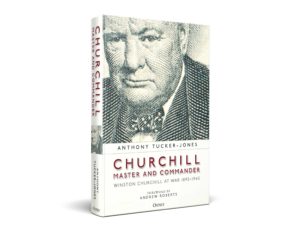Finest Hour 163
Books, Arts & Curiosities – More a Monitor Than a Dreadnought

Winston Churchill, Parliament Square, London © Sue Lowry & Magellan PR
February 6, 2015
Finest Hour 163, Summer 2014
Page 46
By Robert Courts
“Unsinkable”: Churchill and the First World War, by Richard Freeman. Spellmount Publishers, 272 pages, $32.95, Kindle $16.49.
Richard Freeman sets out to persuade his reader that Churchill’s First World War career was one of unequivocal triumph, without a hint of tragedy. Squarely aiming at the casual reader, he argues that the Churchill of the Great War was full of “energy, imagination and courage,” developing his argument with flair, humour and engaging style.

2025 International Churchill Conference
The praise is comprehensive, including such relatively obscure episodes as Churchill’s prophetic 1911 memorandum predicting how the first few weeks of a German attack in the West would develop. We read of Churchill’s work to deploy aircraft and armoured cars at Dunkirk. There is an excellent passage on WSC’s focus on “machines not men”—arguably his greatest contribution to the war. Churchill’s work at the Ministry of Munitions, often-overlooked, is well-handled in good detail, especially the political battles against colleagues.
Freeman mounts a spirited defence of Churchill’s doomed mission to Antwerp, explaining how, as so often in the war’s early months, actions later decried as rash were strongly supported by Kitchener, the war minister, who sent troops and promised Churchill a field command. A triumph of the book is its lucid explanation of how political factors conspired against Churchill during the Dardanelles episode in 1915, and the degree to which Conservative animus—Lord Derby’s most colourfully—caused his fall, delayed his return, and hampered his performance once back in office.
Despite Freeman’s overwhelmingly positive thesis, he does not shun criticism. At the Admiralty, he writes, Churchill’s management style “blurred the boundary between the political role of the First Lord and the professional role of the First Sea Lord” (Fisher), which ultimately led to friction. Churchill’s management of the Goeben chase (see page 22), was marked by a confusion between policy and implementation that struck at the established tradition of the Admiralty and stored up trouble for the future. More stridently, Freeman describes Churchill’s deployment of the Naval Brigades at Antwerp as “totally irresponsible.” Churchill, he says, had “seen the battlefield and knew that it was proving beyond the powers and endurance of well-trained men, yet he nonchalantly plunged his untrained brigades into the battle.”
While engaging, detailed and enthusiastic, this book slightly misses the mark for two reasons. First, Freeman tends to pull his punches in areas where sustained criticism is necessary. For example, one’s impression from the Dardanelles passage, which inevitably is the keystone of the book, is of the naval command’s extraordinary amateurishness; of Fisher dragging his heels, then childishly requiring reassurance in mid-operation; of Churchill and Kitchener pushing onwards; of Churchill not ordering a naval attack in the initial stages whilst de Roebeck, the on-scene commander, vacillated. The reader wants to scream: “Who is in command here?”
Alas, confusion of command is not a point Freeman drives home. H.H. Asquith, in allowing his ministers to run their own private fiefdoms without a unifying direction and command, was deeply culpable.
Second, in his enthusiasm for rehabilitating Churchill, Freeman sometimes brushes over areas where Churchill cannot escape all the blame. Freeman spends a lot of time, for example, denying the “popular mythology” that Churchill originated the Dardanelles campaign. But this is not the main question that should concern a pro-Churchill historian. The main question is: how much culpability attaches to the First Lord as part of an undoubtedly culpable command structure? For example, Churchill did not ensure that Fisher, who was initially supportive, remained with him over the operation; nor did he ensure or explain the inadequate numbers of monitors and minesweepers, and why they were crewed by civilian, not naval, personnel. Even Churchill’s ardent admirers do not believe, as Freeman does, that WSC was never really that keen over the Dardanelles.
While we welcome a pro-Churchill book, one cannot avoid the conclusion that this one is slightly underpowered, despite its enthusiasm, daring and panache. It is engaging and readable, a much needed start to reassessing Churchill’s First World War career during its centenary. But it doesn’t sit in the same league with Barry Gough or Christopher Bell. It’s not a bad book for the general reader: a good start to a complicated topic. But I couldn’t help feeling frustrated that it is more of a “monitor,” when what we need is a “dreadnought.”
Mr. Courts is a longtime FH contributor and member of The Churchill Centre UK who keeps us updated on Bladon (page 8 and FH 161: 57).
Subscribe
WANT MORE?
Get the Churchill Bulletin delivered to your inbox once a month.






